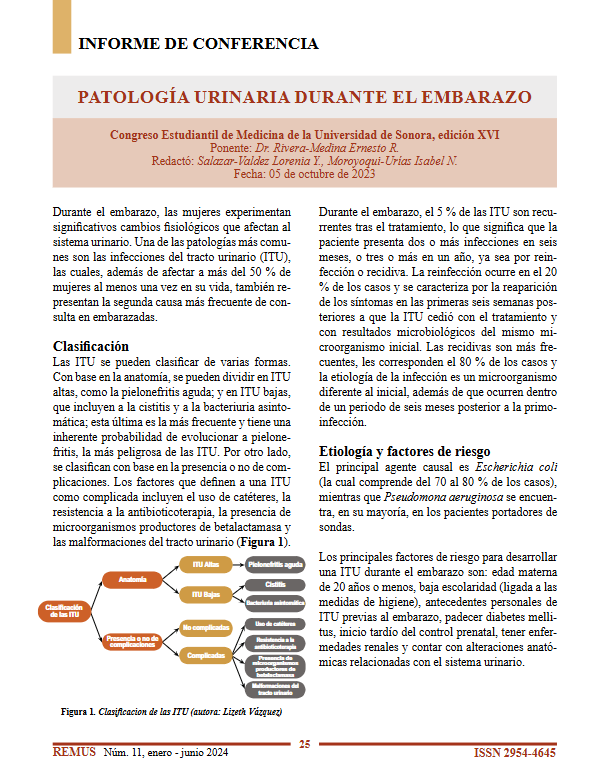Urinary pathology during pregnancy
DOI:
https://doi.org/10.59420/remus.11.2024.193Keywords:
Urinary tract infections, Pregnancy, Asymptomatic bacteriuria, AntibioticsAbstract
Urinary tract infections (UTIs) are among the most common conditions during pregnancy and represent the second leading cause of medical consultation in pregnant women. They are classified into upper UTIs (such as pyelonephritis) and lower UTIs (including cystitis and asymptomatic bacteriuria). Complicated cases may involve risk factors like catheter use or antibiotic-resistant microorganisms.
Pregnancy increases susceptibility to UTIs due to physiological changes. Escherichia coli is the most frequently isolated pathogen. Diagnosis relies on urine culture, recommended from the first trimester, and may be complemented with urine dipsticks when lab access is limited. Early detection—particularly of asymptomatic bacteriuria—is critical to preventing serious complications such as pyelonephritis, preterm labor, or low birth weight.
Treatment depends on the clinical presentation: for mild cases, fosfomycin or nitrofurantoin is recommended; in pyelonephritis, empirical antibiotics such as third-generation cephalosporins are indicated, followed by adjustments based on culture results. Follow-up includes control urine cultures and, in recurrent cases, prophylactic antibiotic therapy.
Preventive strategies include proper hydration, good hygiene practices, avoiding vaginal douching and spermicides, and consuming cranberries as a natural aid.
In conclusion, active monitoring and proper management of UTIs during pregnancy are essential to minimize risks and ensure a safe gestational course for both mother and fetus.
Downloads

Downloads
Published
How to Cite
Issue
Section
License
Copyright (c) 2024 REMUS - Revista Estudiantil de Medicina de la Universidad de Sonora (Journal of Medical Students' of the University of Sonora)

This work is licensed under a Creative Commons Attribution-NonCommercial-NoDerivatives 4.0 International License.

